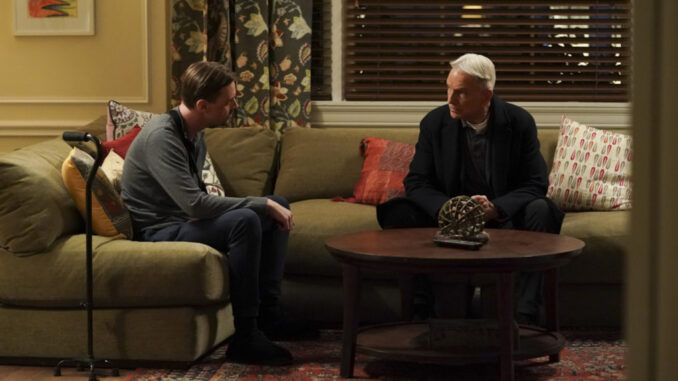
The hum of the table saw had long fallen silent, replaced by the companionable creak of old floorboards in Gibbs's basement. Dust motes danced in the single shaft of moonlight that pierced the grime of the small window, illuminating the familiar chaos of wood shavings, scattered tools, and the half-finished skeleton of a new boat. For years, this was McGee's sanctuary, a place where the taciturn Marine softened, where rules were born, and where the most profound lessons were taught without a single spoken word.
Tonight, however, felt different. A rare stillness hung in the air, not just the absence of noise, but a quietude that hinted at a threshold. Gibbs sat on his workbench, a mug of lukewarm coffee cradled in hands that had built and broken, saved and scarred. McGee, usually brimming with questions, found himself simply observing, sensing the subtle shift in the man across from him. Gibbs’s gaze, usually sharp and penetrating, was distant, introspective, as if he were watching a film reel of his own life playing behind his eyes.
Then, with a sigh that seemed to carry the weight of decades, Gibbs began to unbutton his chambray shirt. McGee’s breath hitched, not in alarm, but in a sudden, intuitive understanding of the gravity of the moment. Gibbs, the fortress, the enigma, was about to lower his drawbridge. He pulled the shirt slowly from his shoulders, letting it fall into his lap, revealing a landscape that stole McGee’s voice, then his breath.
His torso was a living cartography of pain and survival, a testament to a life lived on the razor’s edge. There was the stark, white scar, puckered and angry, high on his left shoulder – a bullet, McGee knew, though he’d never seen the entry point. Below it, a constellation of smaller, faded marks, like distant stars, whispered of shrapnel or a brutal, forgotten melee. His right side bore a long, ragged line, the signature of a knife, perhaps a reminder of an encounter in some forgotten alley or a clandestine operation gone sideways. Further down, near his ribs, was a wider, discolored patch, a testament to a burn, an old explosion, or a fall from a height.
McGee saw not just flesh, but history. Each scar was a chapter, a brushstroke in the brutal masterpiece of Leroy Jethro Gibbs. They were the physical manifestations of the legend, the quiet battles, the sacrifices made in the shadows. He had always known Gibbs was a man of action, a Marine, an agent forged in fire. But to see the very canvas of his being etched with these tales was different. It wasn't just knowing; it was feeling the depth of what Gibbs had endured, carried, and hidden beneath his stoic exterior.
There was no explanation, no dramatic monologue. Gibbs simply sat there, allowing the moonlight to trace the contours of his past. The silence was not empty; it was filled with the unspoken narratives of these wounds. McGee’s initial shock gave way to a profound sense of awe, then a quiet reverence. He saw the resilience, the sheer stubborn refusal to break. He saw the marks of a protector, a warrior who had taken blows so others wouldn't have to.
And then, deeper still, he saw the trust. Gibbs, who guarded his vulnerabilities like state secrets, was offering McGee a glimpse into the very core of his being. It was an invitation to truly know the man, not just the boss, not just the legend, but the flesh-and-blood human who carried these burdens with quiet dignity. It was a passage from mentee to confidant, a recognition of a bond that had transcended the professional to become something akin to family.
The air shifted again as Gibbs slowly pulled his shirt back on, the scars disappearing once more beneath the fabric, but never from McGee’s mind. The moment was fleeting, fragile, a whisper in the vast ocean of time. No words were exchanged, no profound pronouncements made. There didn't need to be. The scars had spoken for themselves, a brutal, beautiful language of survival, sacrifice, and the quiet, enduring strength of a man who had finally, after all these years, chosen to share his truth with the one who was ready to truly see it. And in that raw, vulnerable display, McGee understood more about Gibbs than any dossier, any case file, or any "rule" ever could. He understood the silent weight of a hero.